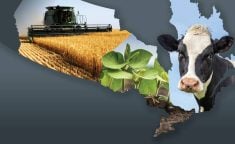WASHINGTON, D. C.
Generic drugs keep drug prices down, could the same work for genetically modified crops when their patents expire?
It’s an idea Tom Vilsack, the United States’ secretary of agriculture, wants to explore.
“We have a generic drug industry in this country, the question is how do we create that kind of industry with seed technology… ?” Vilsack said during a question period with reporters attending the North Amer ican Agr icul tural Journalists’ annual meeting here April 19.
Read Also

The joys of fishing from shore
Manitoba has many lake and river shorelines to drop a fishing line without the cost of a boat, making shore fishing more accessible, and anglers can still catch impressive fish.
“What do you do to create a generic industry? Do you do it by regulation, do you do it by statute or by a combination?”
The patents for some of the first GM traits in plants expire in a couple of years, Vilsack said. In the meantime, officials at the United States Department of Agriculture are thinking about how it can be done.
Generic GM crops might become avai lable, but would farmers buy them? It depends on how much value farmers perceive there is in the next generation of GM crops.
Meanwhile, the U. S. administration is consulting with farmers about the impact of company consolidation and concentration, not just in seed technology, but dairy and livestock processing.
“We need to look at our rules to make sure that marketing efforts allow for fairness and sufficient transparency so that larger producers and smaller producers are basically operating in the same game with the same rules,” Vilsack said.
Vilsack, along with Attorney General Eric H. Holder, Jr., are holding meetings in Iowa, Alabama, Wisconsin, Colorado and here.
Vilsack said he believes biotechnology is necessary to feed a growing world population. It will allow farmers to grow more, using fewer resources, including water, he said.
The European Union is softening its opposition to GM crops, Vilsack said.
“There is still a long way to go, but I think there is a greater willingness to at least look at information where as before you couldn’t even have a conversation, it was a nonstarter,” he said.



















